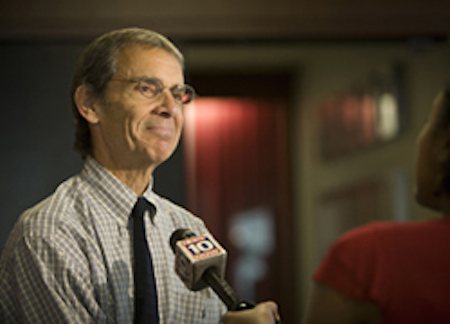Edward McLaughlin joined Cornell University’s Dyson School of Applied Economics and Management in 1983, a time when the school was beginning to expand beyond its land-grant mission and move towards a more traditional undergraduate business curriculum. As a marketing professor specializing in retail, he was one of the first faculty members whose research wasn’t focused in the agricultural sector.
“Thirty or forty years ago, the department’s orientation began to change fairly dramatically towards Main Street business as opposed to agriculture and food business,” said McLaughlin, director of the school’s undergraduate program and the associate director at the Dyson School. “It sort of coincided with my joining, not that I had anything at all to do with it.”
In his thirty-plus years at the school, McLaughlin has witnessed the school’s transformation from a department housed within the College of Agriculture and Life Sciences to its current iteration as the Dyson School of Applied Economics, a bustling school boasting one of the top undergraduate business programs in the country. Dyson’s business program is ranked third in Bloomberg Businessweek’s most recent ranking of undergraduate business schools and tenth by U.S. News & World Report.
While agricultural economics remain a part of the school’s course offerings, the vast majority of student at the school today study traditional management disciplines like finance and marketing. True to its name and heritage, the school differentiates itself by emphasizing economics and analytics in the curriculum and offering a wide array of courses in sustainability and the environment, said McLaughlin, who has overseen the undergraduate program since 1997.
“It has been exciting and rather gratifying to see the reorientation,” he said.
McLaughlin, also the school’s Robert G. Tobin Professor of Marketing, spoke with Poets & Quants’ Alison Damast about the history of Dyson,
how, and why it is getting harder for applicants to get a seat at the school.
What differentiates the Dyson School from other undergraduate business schools?
One of the things that is a little unique about the Dyson School is we began as an arm of agricultural economics in a land-grant agricultural school over 100 years ago. For much of the earlier part of the twentieth century, the focus was on agriculture and food systems, and the department faculty was largely agricultural economists. As the U.S. agricultural sector became a smaller share of the U.S. economy — and certainly that was true in the Northeast where agriculture is a less important market share than in years in the past — faculty members began to apply their economic training to Main Street instead of just the agricultural sector.
When I joined I was one of the first people in the department whose focus was more on the marketing side of retail, as opposed to agricultural marketing. Around that time, we began to offer more courses in general business, general accounting, marketing and strategy. Our department became known as agricultural resource and managerial economics about twenty years ago until we adapted our current name the Dyson School of Applied Economics and Management. We think it is differentiating because we don’t have the word business in the official title of the program. We feel that we have a particular economics and analytically-oriented approach to business, and relative to many places have more depth in economics and analytical methods than most undergraduate business programs.
As an outgrowth of our roots in agriculture and food systems, we still have a strong competitive advantage in the environment or social economics, energy economics, international development and trade and emerging markets. Those are subjects that have been studied in this school for 100 years, and only recently sort of become contemporary important topics in other business schools.
Today we still offer a concentration in agribusiness, but by far the majority, or over 90 percent of students, are what you would regard as traditional management disciplines.
How does the school’s emphasis on applied economics play out in the curriculum?
All students are required to take a fairly rigorous course of analytical methods to include calculus, statistics, micro- and macro-economics, a full year of intermediate economics, which in our case we call managerial economics. We integrate intermediate micro with managerial and strategic theory and a number of upper levels economics courses. We have particularly good economics training.
There has been an explosion in undergraduate business education in the last few years. What do you think are some of the reasons for it? I’m not sure that it is any different at Cornell than at any other place. The economy has had its share of challenges in the last half dozen years or so, and I think for better or for worse many students are looking to get some training in areas of the economy where there seems to be jobs available.
Cornell has a very holistic and broad approach to business. Our students take 40 courses to get a bachelor’s degree and only 15 to 18 of them are in a business major. That means that all the rest, or the majority can be taken anywhere at Cornell University. So our goal is to educate and to produce well-rounded educated citizens, not just business professionals. This is an undergraduate liberal arts degree with a major in business, not an MBA degree.
Perhaps the distinguishing feature is that we are the largest Ivy League school by far, so we have many more schools, departments and course offerings than most other schools. Our students get a particularly broad selection of course to complement their business major in the sciences and the arts and humanities, relative to many places.












Questions about this article? Email us or leave a comment below.